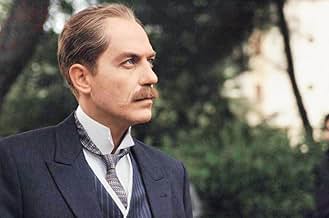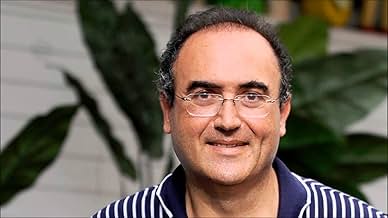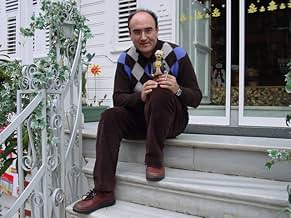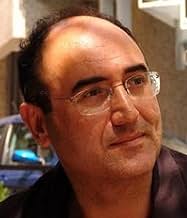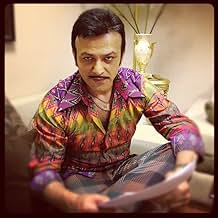Veda
- 2010
- 1 Std. 54 Min.
IMDb-BEWERTUNG
7,2/10
7820
IHRE BEWERTUNG
Füge eine Handlung in deiner Sprache hinzuStory based on the memoirs of Salih Bozok, which traces the life of Mustafa Kemal Atatürk.Story based on the memoirs of Salih Bozok, which traces the life of Mustafa Kemal Atatürk.Story based on the memoirs of Salih Bozok, which traces the life of Mustafa Kemal Atatürk.
- Regie
- Drehbuch
- Hauptbesetzung
- Auszeichnungen
- 1 Gewinn & 4 Nominierungen insgesamt
Özge Özpirinçci
- Fikriye Hanim
- (as Özge Özpirinççi)
Empfohlene Bewertungen
Turkish renaissance man Zülfü Livaneli ("Shahmaran" & "Iron Earth, Copper Sky") draws upon the reminiscences of Atatürk's lifelong friend and loyal ADC Salih Bozok for this sumptuous but shallow hagiographic retelling of the life of the Grey Wolf intended to restore Turkish pride in the wake of the more controversial biopic "Mustafa" by Can Dündar.
With Atatürk on his deathbed a despondent Salih Bozok (Serhat Kılıç) begins to relate the life of the Grey Wolf from their childhood together on the streets of their beloved Thessalonica and on through their military career to the foundation of the republic and the President's tumultuous relationships with Fikriye (Özge Özpirinçci) and Latife (Ezgi Mola).
The talented and prodigious Sinan Tuzcu ("Orada" and "Nefes") takes up the bulk of the screen time as Atatürk between the ages of 25 to 45 but is given very little to work with as the character is two-dimensionally rendered with no apparent emotional depth even when the actor is interacting with his own wife Dolunay Soysert as the Grey Wolf's mother.
Serhat Kılıç heads up the supporting cast as the narrator Salih Bozok but seems curiously absent for all the major events depicted while Özge Özpirinçci and Ezgi Mola are required to carry what little emotional content the film has as the competing love interests and Burhan Güven, Bartunç Akbaba and Kaan Olcay round things out as various incarnations of Atatürk.
The director deliberately sets out to avoid any perceived insult to the Turkish image of their founder and in this respect at least succeeds like any other uninspired hagiography with a loosely strung together episodic collection of supposedly inspiring well-worn incidents from the Grey Wolf's life which ultimately serve to give no true insight into the man himself.
"Unfortunately, words are not enough "
With Atatürk on his deathbed a despondent Salih Bozok (Serhat Kılıç) begins to relate the life of the Grey Wolf from their childhood together on the streets of their beloved Thessalonica and on through their military career to the foundation of the republic and the President's tumultuous relationships with Fikriye (Özge Özpirinçci) and Latife (Ezgi Mola).
The talented and prodigious Sinan Tuzcu ("Orada" and "Nefes") takes up the bulk of the screen time as Atatürk between the ages of 25 to 45 but is given very little to work with as the character is two-dimensionally rendered with no apparent emotional depth even when the actor is interacting with his own wife Dolunay Soysert as the Grey Wolf's mother.
Serhat Kılıç heads up the supporting cast as the narrator Salih Bozok but seems curiously absent for all the major events depicted while Özge Özpirinçci and Ezgi Mola are required to carry what little emotional content the film has as the competing love interests and Burhan Güven, Bartunç Akbaba and Kaan Olcay round things out as various incarnations of Atatürk.
The director deliberately sets out to avoid any perceived insult to the Turkish image of their founder and in this respect at least succeeds like any other uninspired hagiography with a loosely strung together episodic collection of supposedly inspiring well-worn incidents from the Grey Wolf's life which ultimately serve to give no true insight into the man himself.
"Unfortunately, words are not enough "
This is one of the bests in my life! Most of all picture, sound and music is awesome. Story is incredible. As I see Livneli tried to summarize all his life with excellent symbolic events. Unfortunately some people aren't able to think deeply to understand some messages there. I am comparing my history knowledge and movie and I see that Livaneli tried for example to tell all his opinion about secularism with just one well thought scene. It is always easier to say that was not true, the harder one is to be able to say yes he was secularist, we don't know this really happened but thats what Atatürk exactly thought. Which commander dances before going to War? You cant answer this question if you don't know that Zeybek is played by Heros! Which leader has said until today war is a murder if it is not done for defending? He did not turn to Selanik because the defending was over and that would be attack, namely murder! This film is criticized by the people who don't understand the cinema but seems like so, instead of that real cinema criticizers and average public likes this movie very much. I have never seen a movie which was applauded with tears at the end. Thank you Livaneli millions of times thank you! Please ignore the negative comments we know why do they do this! We are aware of everything. I believe this musics will get so many prizes!
Mustafa Kemal Ataturk might be the only great man whose life has not been cinematized properly enough. Along with Ziya Öztan's Cumhuriyet (which is more like a Turkish independence movie than a Ataturk biograph)and Can Dundar's widely criticized Mustafa this is actually the first feature length movie on Ataturk. While Can Dundar's Mustafa was a botched up effort to knock Mustafa Kemal off his pedestal and humanize him, Livaneli's movie re-puts him on his perch. Livaneli's Veda starts when Ataurk is on his deathbed. Salih Bozok, who has been a friend to him since he was six is beside him. He calls for his son and tells him that if Ataturk passes away he will end his own life too.Then he starts to write what he recollects about the great leader. So the whole movie,at first glance,seems to be only from Salih Bozok's point of view. When it comes to history one man's point of view should be able to change the whole history you know about, shouldn't it?
Ataturk was one of the greatest men of the century he lived in and we are aware of the fact that his life could not be grasped in a 120 minute movie so it should be understandable that a movie may focus on one part of his life but exactly on what side of his life Livaneli focuses? From Bozok's eyes, Livaneli offers pieces of vignettes or short, impressionistic scenes that do not sound like an eye opener. For instance, the only tangible scene about his childhood is what young Kemal thinks about a children's game like leapfrog. Apparently, the writer and the director want us to think that Ataturk was too great to bend but not modest enough not to vault over other's stooped backs. If you would like to show someone as a child prodigy there are way better means to do that. Other than that the movie does not tell you anything new about Ataturk's childhood or teenage years let alone the fact that the teenage actor,Bartunç Akbaba,playing Musta Kemal offers a pretty wooden performance. Ataturk was an "homme de guerre" and wars are an inevitable part of "gens de guerre". The only scene you see Mustafa Kemal on the war field is the Gallipoli campaign. Let alone the fact that this amazing and unbelievable victory in Turkish history looks more like a poor reconstruction scene from a documentary, most of the little scene focuses on just a ditch.
When you are making a biopic your forte is supposed to be "character development." In Veda, it looks like that there are not many dynamic characters that level up over the course of the narrative.Other than the two major women who walk into Ataturk's life, no character changes a bit. At some point you think you are watching a movie about Fikriye Hanım vs. Latife Hanım. What about Ataturk's feelings on that struggle between Fikriye,who was representing the Orient and Latife who was the Occident?
While Veda duly notes that Ataturk resisted the pressures of historic enmities or "atrocity-mongering between the societies" it never mentions the resistance he met while realizing his reforms.To a foreign layman, the reforms may seem quite ordinary.Those reforms were historically unprecedented and it caused a major resistance from anti-secular circles in Anatolia which still goes on as a sort of Kulturkampf today.
I might prolong this comment but I guess I made myself clear.As a nation we tend to exalt our movies for no reason (like we have done for "Breath") but movies are not made for just one nation.They are made for the whole world to see. Livaneli's effort may be a worthy one(soundtracks,cinematography,costumes and some visual effects were upsides of the movie)but it's not enough to make the whole world see the great leader on the silver screen. I believe, the more movies are made on Ataturk, the better we will understand his legacy.
Ataturk was one of the greatest men of the century he lived in and we are aware of the fact that his life could not be grasped in a 120 minute movie so it should be understandable that a movie may focus on one part of his life but exactly on what side of his life Livaneli focuses? From Bozok's eyes, Livaneli offers pieces of vignettes or short, impressionistic scenes that do not sound like an eye opener. For instance, the only tangible scene about his childhood is what young Kemal thinks about a children's game like leapfrog. Apparently, the writer and the director want us to think that Ataturk was too great to bend but not modest enough not to vault over other's stooped backs. If you would like to show someone as a child prodigy there are way better means to do that. Other than that the movie does not tell you anything new about Ataturk's childhood or teenage years let alone the fact that the teenage actor,Bartunç Akbaba,playing Musta Kemal offers a pretty wooden performance. Ataturk was an "homme de guerre" and wars are an inevitable part of "gens de guerre". The only scene you see Mustafa Kemal on the war field is the Gallipoli campaign. Let alone the fact that this amazing and unbelievable victory in Turkish history looks more like a poor reconstruction scene from a documentary, most of the little scene focuses on just a ditch.
When you are making a biopic your forte is supposed to be "character development." In Veda, it looks like that there are not many dynamic characters that level up over the course of the narrative.Other than the two major women who walk into Ataturk's life, no character changes a bit. At some point you think you are watching a movie about Fikriye Hanım vs. Latife Hanım. What about Ataturk's feelings on that struggle between Fikriye,who was representing the Orient and Latife who was the Occident?
While Veda duly notes that Ataturk resisted the pressures of historic enmities or "atrocity-mongering between the societies" it never mentions the resistance he met while realizing his reforms.To a foreign layman, the reforms may seem quite ordinary.Those reforms were historically unprecedented and it caused a major resistance from anti-secular circles in Anatolia which still goes on as a sort of Kulturkampf today.
I might prolong this comment but I guess I made myself clear.As a nation we tend to exalt our movies for no reason (like we have done for "Breath") but movies are not made for just one nation.They are made for the whole world to see. Livaneli's effort may be a worthy one(soundtracks,cinematography,costumes and some visual effects were upsides of the movie)but it's not enough to make the whole world see the great leader on the silver screen. I believe, the more movies are made on Ataturk, the better we will understand his legacy.
Of course it's not a Darkest Hour or Der Untergang. But it's a decent movie.
Even CGI are not that bad. War props are even good.
Cars look so new because they couldn't aged classic cars. But it's Ok
Scenes are overly dramatized but it's a blockbuster movie for Turkey so It's a must for our market.
Story is Great but lots of incidents happens in a short time so no time for war and most of the politics.
Zülfü Livaneli. You are a decent moviemaker. Decent storyteller. And it is your masterpiece. Very well done. But where is Ismet Pasha?
Even CGI are not that bad. War props are even good.
Cars look so new because they couldn't aged classic cars. But it's Ok
Scenes are overly dramatized but it's a blockbuster movie for Turkey so It's a must for our market.
Story is Great but lots of incidents happens in a short time so no time for war and most of the politics.
Zülfü Livaneli. You are a decent moviemaker. Decent storyteller. And it is your masterpiece. Very well done. But where is Ismet Pasha?
This film especially emphasizes important events or milestones in Atatürk's life from Salih Bozok's eye. Expressing way of this story very emotional. If you have got little knowledge about these years, it is not possible to cry. Of course this film shows part of a history with Atatürk's life but not telling in a epic way. First time I like Zülvi Livaneli's work. It's so hard to talk about these years objectively. And I once again admired Atatürk. Maybe because of his great success and admiration for Atatürk, people think this kind of movies not enough and ineffective. Maybe that's right I agree in some sense with this idea. Although there is no accomplished biographical movies about Atatürk, we should respect endeavor of this filmmakers. Thank you everyone who contributed to this thought- provoking story.
Wusstest du schon
Top-Auswahl
Melde dich zum Bewerten an und greife auf die Watchlist für personalisierte Empfehlungen zu.
- How long is Veda - Atatürk?Powered by Alexa
Details
- Erscheinungsdatum
- Herkunftsland
- Offizielle Standorte
- Sprache
- Auch bekannt als
- Veda - Atatürk
- Drehorte
- Thessaloniki, Griechenland(location)
- Produktionsfirma
- Weitere beteiligte Unternehmen bei IMDbPro anzeigen
Box Office
- Budget
- 6.000.000 $ (geschätzt)
- Weltweiter Bruttoertrag
- 55.024.621 $
- Laufzeit1 Stunde 54 Minuten
- Farbe
- Seitenverhältnis
- 2.35 : 1
Zu dieser Seite beitragen
Bearbeitung vorschlagen oder fehlenden Inhalt hinzufügen


